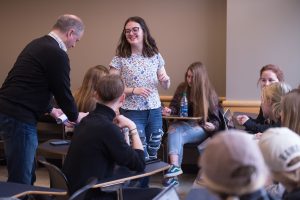9 Authentic learning experiences
What are authentic learning experiences?
Authentic learning experiences in a university setting are designed to reflect real-world scenarios, challenges, and applications. These experiences go beyond theoretical knowledge and textbook learning, providing students with opportunities to engage in meaningful, hands-on activities that mimic or simulate professional or practical contexts. While authentic learning experiences are more easily done in major and graduate courses, you can still find ways to make the work in your large lecture course meaningful and authentic to student experiences.
How can you use authentic learning experiences in your course?
 In the case of courses with lab components, authentic learning experiences are already core to what you do every week. However, there are ways to relate your course topics to your students’ lives in other manners. Some examples of ways you can use authentic learning in your classroom:
In the case of courses with lab components, authentic learning experiences are already core to what you do every week. However, there are ways to relate your course topics to your students’ lives in other manners. Some examples of ways you can use authentic learning in your classroom:
- Case Studies: Presenting students with real or realistic cases that require analysis, problem-solving, and decision-making. Case studies allow students to apply their knowledge and skills to complex, real-life situations, often involving ambiguity and multiple perspectives.
- Simulations and Role-Playing: Creating simulated environments or scenarios that replicate real-world settings. Simulations and role-playing exercises allow students to practice problem-solving, decision-making, and interpersonal skills in a controlled and experiential learning environment. These may be most applicable in discussion or lab sections, rather than in the large course; this is then an intervention in which you can train your teaching team.
- Collaborative Projects: Assigning group projects that require students to work together to solve complex problems or complete a significant task. Collaborative projects promote teamwork, communication, and the integration of diverse perspectives, mirroring the collaborative nature of many professional settings.
What results can you expect from incorporating authentic learning experiences into your course?
There are several benefits your students can achieve through your use of authentic learning experiences in your course. Some include:
- Increased Relevance: Authentic learning experiences make the course content more relevant and meaningful to students. By connecting academic concepts to real-world situations, students can see the practical applications and significance of what they are learning. This enhances their motivation and engagement with the material.
- Improved Retention and Understanding: Engaging in hands-on, experiential learning fosters deeper understanding and retention of knowledge. Authentic learning experiences encourage active participation, critical thinking, problem-solving, and reflection, which help students internalize the concepts and make connections across different contexts.
- Bridging Theory and Practice: Authentic learning experiences bridge the gap between theory and practice, allowing students to see how the knowledge and skills they acquire in the classroom can be applied in real-world settings. This prepares them for the complexities and challenges they may encounter in their future careers.
Overall, incorporating authentic learning experiences in college courses can enrich students’ learning, engagement, and preparation for their future endeavors, contributing to their personal and professional growth.
Who can help if you’re interested in incorporating authentic learning experiences into your course?
If you would like to explore how you could use this in your course, please reach out to the Center for Teaching for assistance and guidance on how best to implement these activities.
